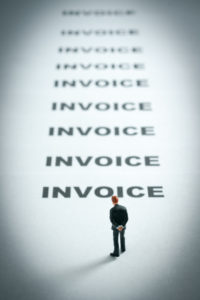The Need for Invoice Factoring in a Growing Economy
 CNBC released an economic survey in 2017 revealing that a majority of the U.S. population was optimistic about the economy – the first time in over a decade. The growth the economy experienced over the last year is expected to continue. According to economists, the unemployment rate will continue to decline, and the economy will experience solid growth. Recent decisions on taxes and regulations have also led to a more pro-growth environment for businesses. Small and mid-sized businesses are a major source of employment and economic activity for the U.S. Therefore, securing business funding will be key in seizing growth opportunities. This is where invoice factoring can help.
CNBC released an economic survey in 2017 revealing that a majority of the U.S. population was optimistic about the economy – the first time in over a decade. The growth the economy experienced over the last year is expected to continue. According to economists, the unemployment rate will continue to decline, and the economy will experience solid growth. Recent decisions on taxes and regulations have also led to a more pro-growth environment for businesses. Small and mid-sized businesses are a major source of employment and economic activity for the U.S. Therefore, securing business funding will be key in seizing growth opportunities. This is where invoice factoring can help.
What is Invoice Factoring?
Far from a new financing method, invoice factoring is one of the oldest forms of business funding, dating back to ancient Mesopotamia. Factoring invoices allows businesses to use their outstanding invoices to generate cash quickly. The business sells its accounts receivable (invoices) to a third party (factoring company) at a discount. The factoring company then quickly advances the working capital needed against the business’ unpaid accounts receivable. The fact that the business is being provided money it has already earned for its immediate cash needs has made factoring a very attractive cash solution.
How Does the Factoring Process Work?
Step 1 – Your business serves its customers by providing a product or service. Once the product or service has been delivered or fulfilled, an invoice is then issued for the customer to pay you. For these invoices to qualify for factoring, they must be payable within 90 days.
Step 2 – If the factoring company decides to approve your business, a contract is signed between you and the factor detailing rates and limits.
Step 3 – The factoring company will also conduct due diligence to ensure the customers you are invoicing are good credit risks.
Step 4 – Your company then submits and sells your outstanding invoices to the factor. The factoring company will verify the invoice by making sure the product was delivered and/or the service was performed.
Step 5 – You will then receive an initial advance known as the “advance rate”. Typical advance rates range from 80% to 95%, but will ultimately be determined by the size of your transaction and your industry.
Step 6 – Your customer is then obligated to pay the factor according to the terms of the invoice, typically within 30 to 60 days. While the factoring company works on the collections process, your business operates as usual – you may even submit new invoices for funding during this time if you choose.
Step 7 – Once the factoring company receives payment from your customer, the factor will give you the remaining balance of the invoice, minus any factoring fees.
How Invoice Factoring Helps Businesses
There are many ways invoice factoring can help a growing business. Consider the common situation where a business receives an order, purchases the necessary supplies and pays its employees to fulfill that order. Once completed, the business sends an invoice to the customer that is due in 60 days. In the meantime, the business meets a potential new customer, but does not have the cash it needs to purchase supplies and pay its crew to fulfill that job.
Instead of turning down the opportunity, the business can factor the previous invoice and receive an advance quickly. The business can say “yes” to the new job, purchase supplies and cover payroll. The business not only gains a new customer, but also takes a step towards further growth. This is just one of the many examples of how invoice factoring can help business owners fund growth and seize opportunities when they arise.
The Benefits of Invoice Factoring
The biggest, most obvious benefit of invoice factoring is that it provides the working capital to streamline your daily operations and grow your business. However, there are numerous other benefits to utilizing invoice factoring:
Speed- Factoring companies can place cash in your business’ bank account in as little as 24 hours.
Simplicity- To secure traditional lending, business owners must wade through seemingly endless paperwork and devote a lot of time to the process. Invoice factoring often requires significantly less paperwork and time giving you faster access to your cash.
Poor or No Credit- Businesses with poor or no credit rarely secure the traditional lending they need. Because factoring is based largely on your customer’s credit, you are more likely to secure a factoring line.
No Debt- Invoice factoring is an advance of money your business has already earned and is waiting to be paid – it is not a loan; thus, factoring does not add any debt.
Flexible Financing Amount- The amount available through factoring is only limited by the amount of eligible invoices you have to factor, making it the ideal solution for a growing company. As your business grows and builds a relationship with the factoring company, your business’ credit line increases.
Outsourcing Time-Consuming Tasks- If you choose to, you can also secure additional help with many back-office tasks and lessen the burden of dealing with accounts receivable and collections.
Who is Invoice Factoring For?
This financing option is used by Small businesses, startups, midsize businesses, businesses in a turnaround phase and businesses experiencing rapid growth, to name a few. Startups and small businesses frequently turn to invoice factoring because they struggle to secure working capital with banks and other traditional lenders. In addition, businesses that have a gap between when cash comes in and when expenses are due greatly benefit from the flexibility and quick cash invoice factoring provides.
There are several industries that frequently use invoice factoring:
- Oil and gas
- Transportation
- Business services
- Manufactures
- Distributors
- Staffing
- Government
- Construction and contractors
The Cost of Invoice Factoring
The cost of invoice factoring will depend on several different factors: the business’ industry, volume and the factoring company itself. Advance rates are typically anywhere from 80% to 95% of the invoice. The factoring fee involved covers the collection risk for the factoring company. This fee will be based on the size of the invoice, your credit rating and how long the invoice is expected to remain unpaid.
Common Misconceptions about Invoice Factoring
Unfortunately, there are several misconceptions about invoice factoring that prevent some business owners from taking advantage of its many benefits. Unsure of what it is and what to look for, they miss a great opportunity to boost their business’ cash-flow. Here are a few of the most common misconceptions:
Invoice factoring is a loan. Contrary to popular belief, invoice factoring is not a loan. Because the factoring company is buying your receivables at a discounted rate, there is no new debt. Your business is simply being provided cash it has already earned.
Factoring is only for failing companies. Invoice factoring is used by businesses of all shapes and sizes to boost cash flow, fuel growth and cover operational expenses. As mentioned previously, small businesses, startups, businesses in a turnaround phase, seasonal businesses and businesses experiencing rapid growth are just a few of the business types and situations in which a business can benefit from this financing option.
Factoring takes away control over invoices. The biggest concern many businesses share is that handing over their invoices to the factoring company means they lose control over them. While you are taking advantage of the factoring company’s services, you maintain the ability to choose which credit approved customers you wish to factor, and which invoices you want to factor from those customers. The factoring company simply reviews and then purchases the invoices; it does not create or alter them in any way.
Factoring is only sought-after by businesses not credit-worthy enough for a bank. While creditworthiness – or lack thereof – is a reason why businesses choose factoring, it is far from the only reason. Rapid growth (which leads to heavy receivables), limited time in business, existing debt, weak cash-flow, poor or no credit and insufficient collateral are just a few of the many reasons traditional lenders turn businesses away.
Factoring is typically a business’ second choice. Just because your business can secure traditional lending does not mean that it is your best option. In fact, many businesses that qualify for traditional lending soon find themselves right back where they started: in need of additional working capital, but now with an extra burden of debt. Factoring offers the ideal solution because it not only provides cash quickly, but also provides help with credit and collections. In light of this, many businesses that could turn to traditional lending turn to factoring companies instead.
Invoice Factoring for a Thriving, Growing Economy
While access to traditional lending has improved recently, the long wait times for funding, strict requirements and added debt do not make this option ideal. Factoring, on the other hand, is a solution that provides financial stability for long-term growth. This working capital will allow your business to meet payroll, pay taxes, purchase equipment and supplies, cover expenses, pay suppliers and keep your business operating smoothly. Above all, this quick access to cash will ensure your business can take advantage of the many opportunities a booming economy has to offer.
Security Business Capital has built an experienced and dedicated team of individuals with years of expertise in providing flexible cash flow solutions that help businesses thrive. Oil and gas services, temp staffing, manufacturing/distribution and transportation are just a few of the business types that can use Security Business Capitals’s invoice factoring services to generate cash on hand. If you are interested in learning more about how our invoice factoring services work and how they can help your business grow, get in touch with us today for a free quote and/or consultation.





